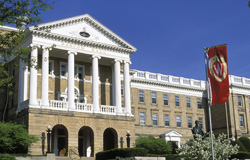Pre-Conference Workshops and Tutorials
The
CSCL 2013 PRE-CONFERENCE WORKSHOPS AND TUTORIALS Committee invites
submissions of proposals for Pre-Conference Events. Proposals are due
no later than December 15, 2012.
The 2013 Computer-Supported
Collaborative Learning conference is being hosted by The University of
Wisconsin-Madison. The conference runs from June 15, 2013, to June 19,
2013. Full-day workshops will be scheduled on June 15th, and half-day
workshops on June 16th. The main conference program will begin in the
afternoon on June 16th.
Individuals and groups are invited
to offer Pre-Conference events, which will take place on June 15th and
16th. We invite a range of events varying in content, aim and
structure. The general goal is to offer participants an opportunity to
engage in professional exchange in interactive and personal settings.
Events
should cohere with the conference theme: “To see the world and a grain of
sand: Learning across levels of space, time, and scale.” Computer
supported collaborative interactions in both online and face-to-face
contexts occur at multiple levels of time, space, scales of analysis,
and scales of group/population structure, to name a few. So, preference
will be given to those proposals that reflect this unique aspect of
CSCL in which interactions and learning need to be understood,
supported and analyzed at multiple levels. Proposed events can include
sessions devoted to learning about specific concepts, methods or
techniques, or to furthering our knowledge and understanding through
group discussion and problem solving.
Pre-conference events include workshops or tutorials:
•
Workshops should be designed as collaborative knowledge-building
sessions on a focused issue, where participants actively work together
e.g., analyzing data, discussing design criteria, collaborating on a
research project. Substantial time should be allocated for interaction
between participants. The presentation of a set of related papers is
not considered a workshop.
• Tutorials
should be designed as collaborative learning experiences for novices on
a topic, technology, or methodology within CSCL, presented by experts.
Tutorials should stimulate active participation and interaction between
participants as well.
Innovative format submissions are encouraged, provided they are within the scope of a workshop or tutorial.
We
may request proposals that are very similar to each other to merge, or
at least coordinate in a manner that ensures that interested
researchers do not feel there is a conflict between them. In order to
detect potential conflicts or overlap in advance, the chairs request
that workshop or tutorial organizers email us in advance of the
submission deadline with a brief abstract of your plans.
Preconference event proposals are comprised of two pieces:
1.
a 5-page description that would eventually appear in the
conference proceedings (and should adhere to the proceedings format
guidelines);
2. a 5-page description for the
preconference events committee to evaluate not only the content of the
event, but also the process through which it will be put together.
Submission Instructions (both pieces):
• Proposals for full or half-day events should be written in English.
•
Brief abstracts should be emailed by November 15 to the two
events chairs: Chee Kit Looi (cheekit.looi at nie.edu.sg) and Gijsbert
Erkens (G.Erkens at uu.nl).
• Final proposals
should be submitted via the online submission system at
https://precisionconference.com/~cscl/
• Proposals are due no later than December 15, 2012.
1. 5-Page Description for Proceedings
Proposals
should not exceed 5 pages. These should be written with the reader of
the conference proceedings in mind, who may be reading the description
after the event has taken place. The format can be flexible, but it is
suggested that the proceedings description include:
• Title of event
• Organizers' names and backgrounds
• Theme and goals
• Theoretical background and relevance to field and conference
• Expected outcomes and contributions
2. 5-Page Proposal
Proposals
should be written with the Events Chairs as the intended audience,
telling us about practical issues we need to know to evaluate the
proposal. Proposals should not exceed 5 pages, and should include:
• Title of event
• Organizers' names and backgrounds, including prior experience in conducting such events
• Intended audience
• Duration of event (half day or full day)
• Description of format and schedule of activities planned
• Participation requirements (how tutorial or workshop participants will be chosen)
• Relationship to similar events conducted in the past (e.g. at CSCL or ICLS), if any
• Facilities and equipment required
• Minimal and maximal number of participants expected
• Draft call for participation that will be posted by organizers if the event is accepted
Formatting instructions are downloadable at: http://www.isls.org/cscl2013/home.htm
Proposal Selection Process
•
Proposals will be reviewed by members of the Pre-Conference
Workshops and Tutorials Committee. Proposals may also be reviewed by
additional judges at the discretion of the committee.
•
If two proposals are found to be very similar, organizers will be
asked to consider whether to merge the proposals, to coordinate by
morning and afternoon sessions, or to justify the viability of running
the events in conflict with each other.
• We expect to send out acceptance notifications during January 2013.
• Proposals must follow the format instructions and adhere to the word count limit.
•
Organizers of accepted workshop and tutorial proposals will be
expected to prepare descriptions of the event suitable for posting on
the conference website and for publication in the conference
proceedings.
• Organizers will be responsible for soliciting and selecting participants.
Evaluation
To
create a high-quality program representing the newest ideas and results
in the field, submitted proposals for workshops and tutorials will be
evaluated with respect to:
• Originality
• Quality
• Significance
• Relevance to a specified target audience of CSCL researchers
• Clarity
• Workshop / tutorial activities
• Participant interaction

